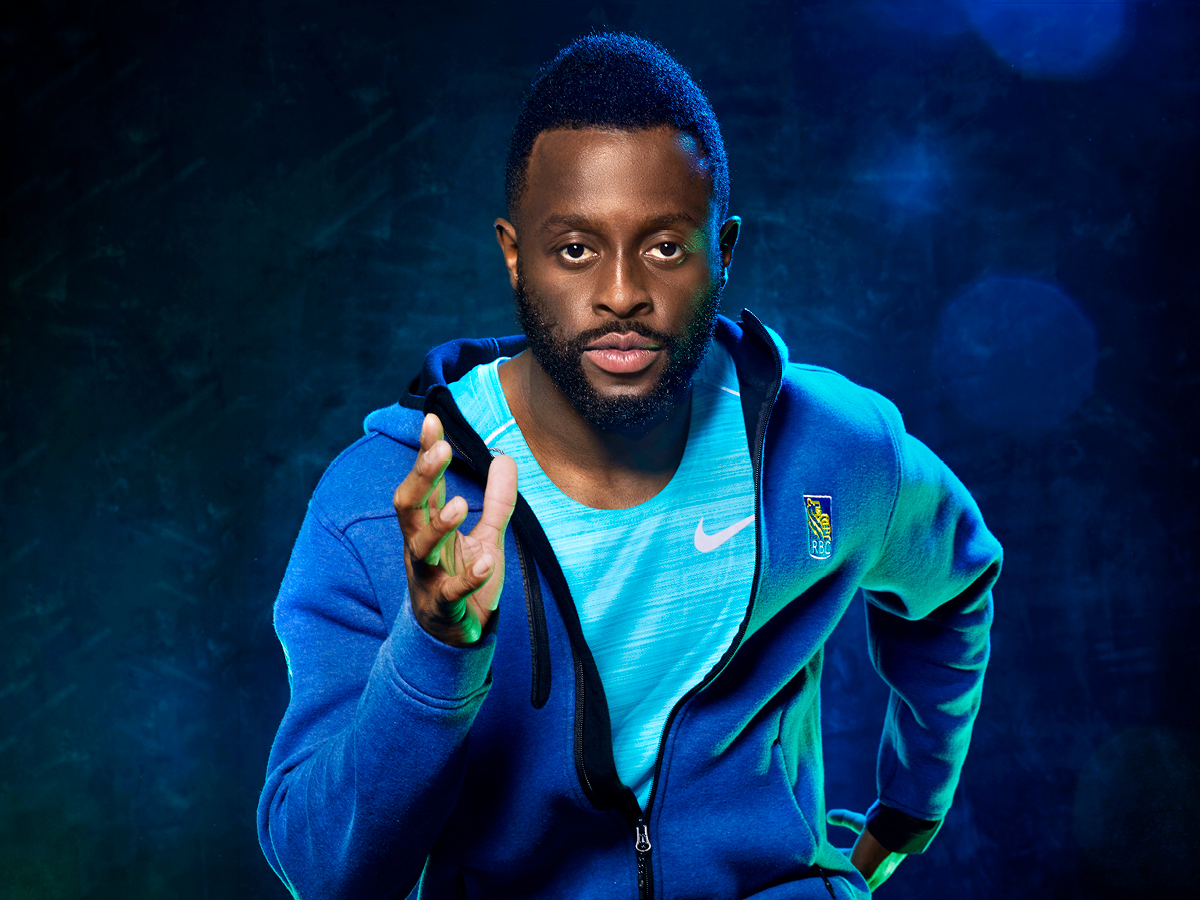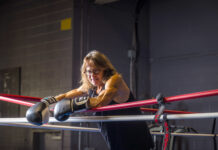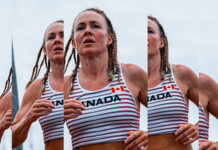On a good day, Sam Effah runs 100 metres in about 10.2 seconds
So when the elite Canadian athlete found himself barely able to make his way across the room as he recovered from hip surgery, it was not his best performance.
The young athlete, named ‘Fastest Man in Canadian University History,’ made an impressive return to his sport many painful months later.
And six years after that, Effah was ready for the 2020 Olympics.
But those dark days left him a changed man.
“I have a whole new appreciation for training and competing. Now, every day is a bit of a blessing,” he says.
“I’m now that guy who is 20 minutes early for training and I’m excited and I’m in my own zone and I don’t take it for granted.”
That brutal blow in 2014 was just as hard on his psyche as his body.
“In that moment, I realized that could be it. You need your hips to run. Your career kinda crashes before your eyes. It could be taken away from you in seconds,” Effah says.
Key to his comeback, was the mental shift required to redefine himself.
“Of course, I wanted to be on the track again. But mentally, I needed to be OK with who I am. As an athlete we get identified so heavily in our sports sometimes that we forget who we are outside of it,” he says.
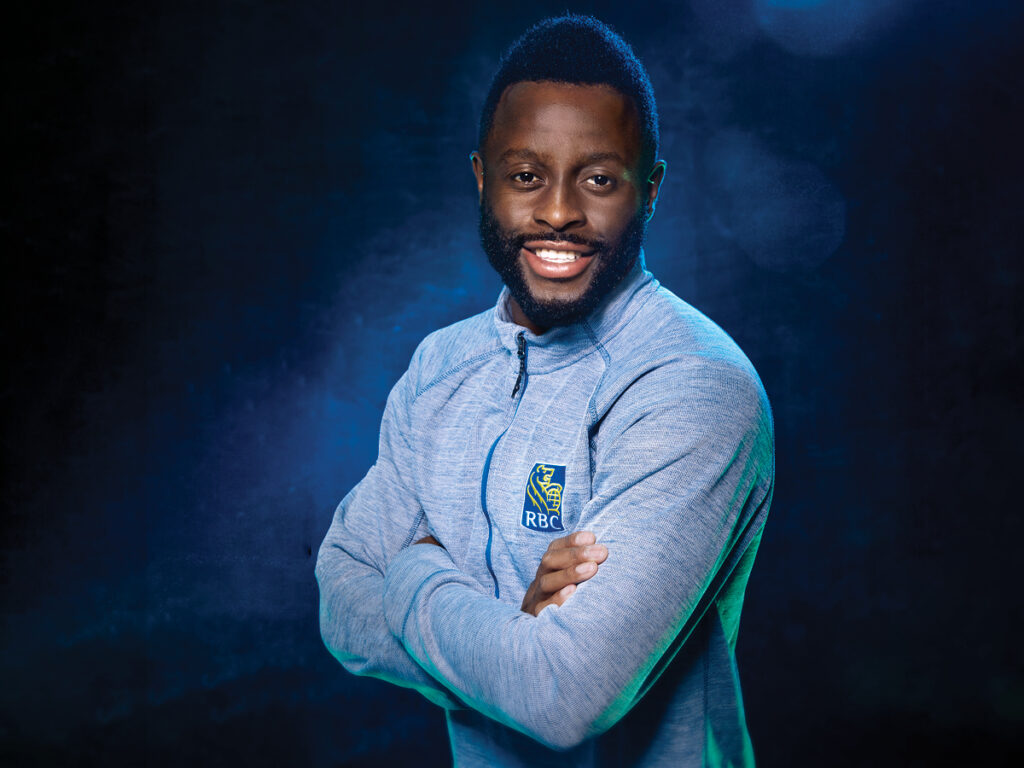
To get back on track, Effah had to dig deep into what he valued beyond sport.
He had just graduated with his Bachelor of Commerce degree at the University of Calgary, was training for the Tokyo 2020 Olympics and was one of the lucky few Canadian athletes hired into the RBC Olympians Program when the doctor told him he was about to be sidelined.
“The world was in my hands but at the same time, I couldn’t do what I loved, so that was very scary and there was a lot of deep reflection,” he says. “If I’m not a track athlete, what am I? And if I do get back on the track, how am I gonna use this opportunity to not only better myself but impact people?”
The 31-year-old says he was looking for something meaningful as he went from crutches to running when he signed up with the Classroom Champions Mentor program which recruits elite athletes to guide students.
But the youngsters turned the tables on him. They called Effah out on what they saw as bravado, a front behind which was a man struggling to be what he claimed to be.
“The funny part was these kids were inspiring me and pushing me to get back on my feet, telling me they believe in me and the dream I have. And if I am gonna teach them to have perseverance then I have to have it myself,” Effah says. “They helped me believe in myself.”
One day Effah made a surprise visit to one of the schools to meet the students he mentored via the virtual program.
And it was life-changing.
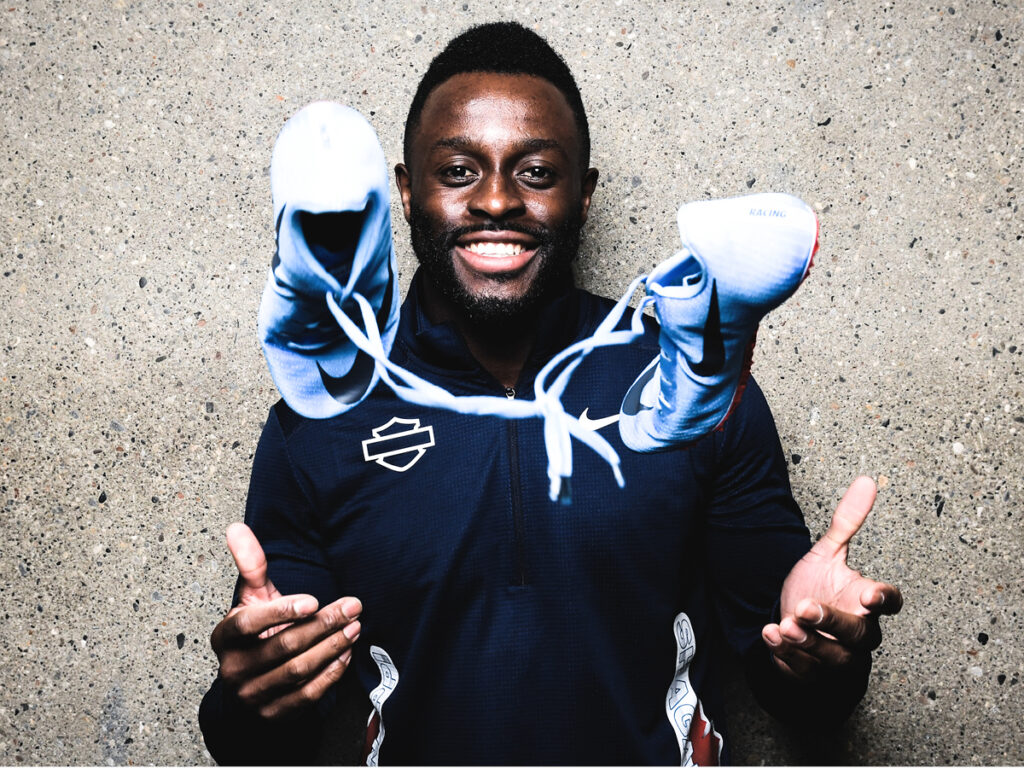
“One kid – this young black kid who looks just like me – was hugging me and saying, ‘Because of you, I believe I can be a runner. Because of you, I believe I can go to university,’” he says.
“It was at that moment that I realized it is not just about being on the podium but using those experiences to impact your community.”
“When I was growing up, there were not a lot of black speakers coming to my school, so if I can be that for people who look like me or people who don’t look like me then I know I’ve done my job.”
Effah says the struggles are part of the story.
“I want them to see athletes are human. We have a tonne to give back in terms of mental resilience and strategies to get back on our feet. It’s one thing to see people on the podium. It’s another thing to see them go through the trenches,” he says.
Effah has been with the RBC Olympians Program for five years – an opportunity which prepares him for life after sport but also offers a platform where he can show others how hardship can be a gift. He is also teamed up with RBC Future Launch where he works with the Youth Strategy and Innovation team to empower young Canadians to reach their goals. Just recently, Sam moved into a new role with RBC onto their Youth Strategy and Innovation Corporate Citizenship team, where he will be assisting on Future Launch projects and doing his capstone project at Queen’s with one of their initiatives.
“You need to be OK with losing, with injury and need to kind of have this muscle called resiliency. If you don’t have that, the sport can be very unforgiving and that’s just like real life. It’s not about winning. It’s about having the skills to be successful,” he says.
“One of my favorite sayings is, ‘We don’t rise to the occasion, we fall to the level of our training.’ You’re not just gonna show up and make it to the podium.”
Effah looks for the lessons in life. And he has had plenty.
His first international competition put him on the track beside Usain Bolt – an eight-time Olympic gold medalist widely seen as the greatest sprinter of all time. Effah could have gone into it assuming he’d lose. But he refused to see it that way.
“He broke the world record the day I raced him … but you have to push and ultimately believe in yourself,” he says.
“It was obviously nerve-racking but either I can fail before I get to the line or I can give it a shot and I didn’t want to let all of my training be in vain.”
Effah placed third and qualified for the next round.
The lesson?
“In terms of mindset, even outside of the track, don’t put limits on your own abilities. Everybody started somewhere,” Effah says.
That goes for trying new things.
Effah will be the first to say he is the least likely contestant for Amazing Race Canada – “afraid of heights and never camped in my life” – but he applied because he liked that they were looking or someone with a story, someone resilient and committed to community.
He got in and along with Canadian hurdler, Sarah Wells, took runner-up in Season 7 of the race last year.
Many false starts have taught Effah, (who was awarded $10,000 USD by Global Sports Development for his work with non-profits, volunteering and speaking engagements worldwide a few years ago), that diversifying isn’t for dummies. Now, he invests not only in his pursuit of an Olympic dream but other aspects of life.
“You can’t put your life on hold,” says Effah, who is working on his master’s degree in Management, Innovation & Entrepreneurship at the Smith School of Business at Queen’s University.
But don’t count him out for the Olympics, either. The athlete who will tell you he was too short for basketball and didn’t opt for football because he didn’t want to get hit has found his passion and he’s taking it as far as he can.
“I think right now, my biggest fear is not being able to reach my full potential,” he says. “I’m so glad I am able to keep pushing to get there.”
Earlier this summer, when he learned the Olympics might go sideways he was just weeks away from the qualifiers. It was a Friday the 13th and another reality check of how easily life can change in a split second.
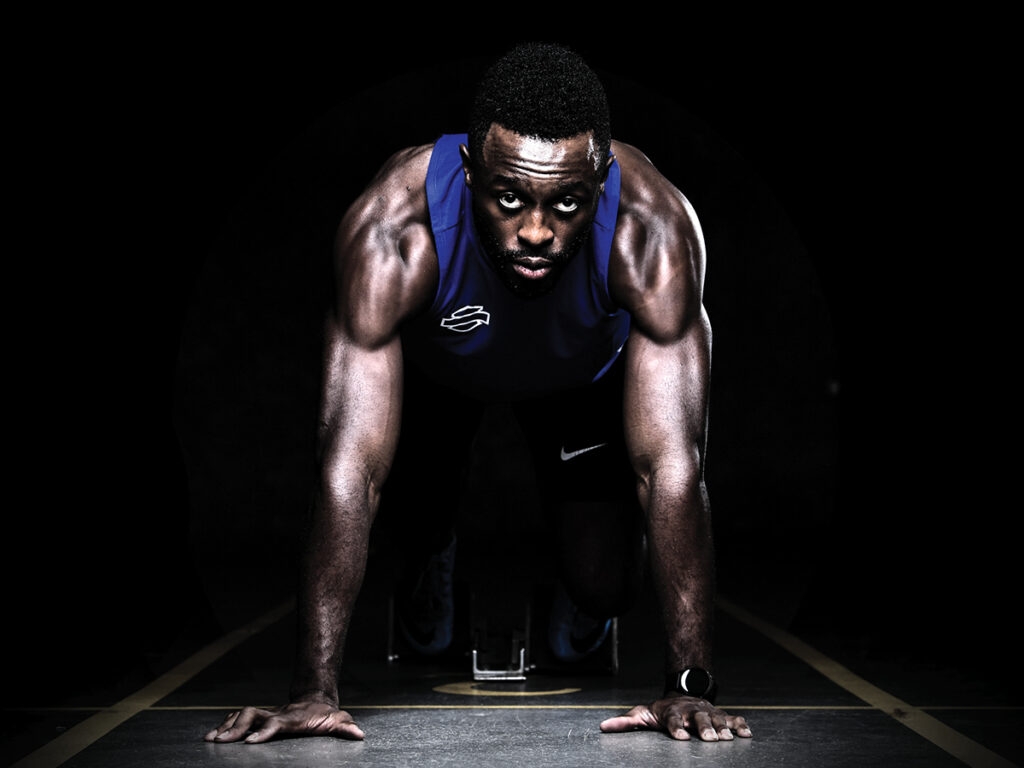
“We had an amazing training session and I was thinking back to all the setbacks and successes. I’ve got three world championships, three World University Games, two Commonwealth games and this is the one thing I’m missing,” he says.
“I thought, in two to three weeks things will be good. But things never opened up. It was hard to accept that after being so ready.”
But disappointment was replaced with something more important.
“I’m doing a privileged sport. And the fact that I’m able to run and compete and do things internationally is amazing but at same time people are dying and going through a global pandemic so you’ve got to see the bigger picture,” Effah says. “It’s not about me. People are losing their jobs, I have friends and their families who are sick and, if anything, I’m thinking of the nurses and doctors working overtime and here I am focussed on running in a straight line. A big part of it was about perspective.”
Effah is now training to qualify in June 2021 for a spot in the 2020 Olympics which are delayed a year due to fall-out from the COVID19 outbreak.
Athlete Highlights
| Status | Event |
| 2-Time | Canadian 100m Champion |
| Competitor | 3 World Championships |
| Competitor | 2 Commonwealth Games |
| 13-Time | Canadian national track and field team member |
RBC Olympians Program
Dedicating years to sport is an all-consuming endeavor for Canada’s elite athletes. But when they are done chasing Olympic dreams, an entire world of new opportunities awaits.
“We recognized an elite athlete probably started their sport at an early age and their entire life was dedicated to that sport,” says Jerilynn Daniels, RBC’s Regional Director, Community Marketing and Citizenship (Alberta & Territories).
“In many cases when they are set to retire at the ripe old age of 20 whatever or 30 whatever, many don’t have a lot of real-world work experience.”
In 2002, RBC launched its Olympians Program to help athletes better prepare for life after sport. Olympic and ParaSport athletes, recruited to work as ambassadors, get work experience and connections that will serve them in their next career.
“It takes an incredibly strong person to endure the tireless training and approach each day with resilience and mental fortitude in these uncertain times,” said RBC Regional President Jeff Boyd, Alberta & Territories. “These athletes have given their lives to sport and train so diligently to represent our country on the world stage. I’m confident our RBC Olympians have the strong mental endurance to overcome new challenges and prepare for a whole new competition in Tokyo.”
Key to its success, is the recognition that transitioning to life after sport can be tough even for individuals with the mental fitness required to achieve athletic goals on the world stage.
It requires preparation which the Olympians Program provides through boots-on-ground experience and opportunities to, essentially, repurpose the very skills that made them champions in sport into whatever will see them excel in occupations they pursue after they hang up their skates.
It builds the tools and confidence required to make the mental shift from living in the Olympic realm to something, perhaps, a bit more ordinary.
Athletes hired into the program work with RBC’s sponsorship and marketing teams and represent the corporation at community events, including speaking engagements which are mostly virtual these days.
Their sports commitments are priority with the program working around training and competing schedules in a way few, if any, employer would.
The program is as much an investment in an athlete as it is a gift to Canadian communities with the Olympians uniquely positioned to share experience on everything from fitness to strategies on goal setting and the moxie it takes to achieve a winning mental mindset.
“They bring a level of conversation many of us can’t imagine. What does it feel like to walk into an Olympic stadium and represent your country? What did it feel like to win a gold medal or what did it feel like to miss it by 1/100th of a second? They teach us a lot about resiliency,” Daniels says.
The Olympians Program is just one way RBC is committed to young Canadians.
With RBC Future Launch, it is investing more than $500 million over 10 years into preparing youth of today for the future, mental health being just one component of the initiative which is the largest commitment to a single issue made by a corporation in Canadian history.
Photography by Trudie Lee and Candice Ward
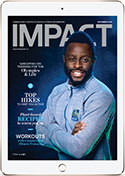 IMPACT Magazine’s November Edition
IMPACT Magazine’s November Edition
RBC Olympic hopefuls Hayley Daniels, Sam Effah and Kate Wright as our inspiring cover athlete stories! Get prepared for winter running, making movement part of your workday, and exploring great hikes near Calgary and Vancouver.


